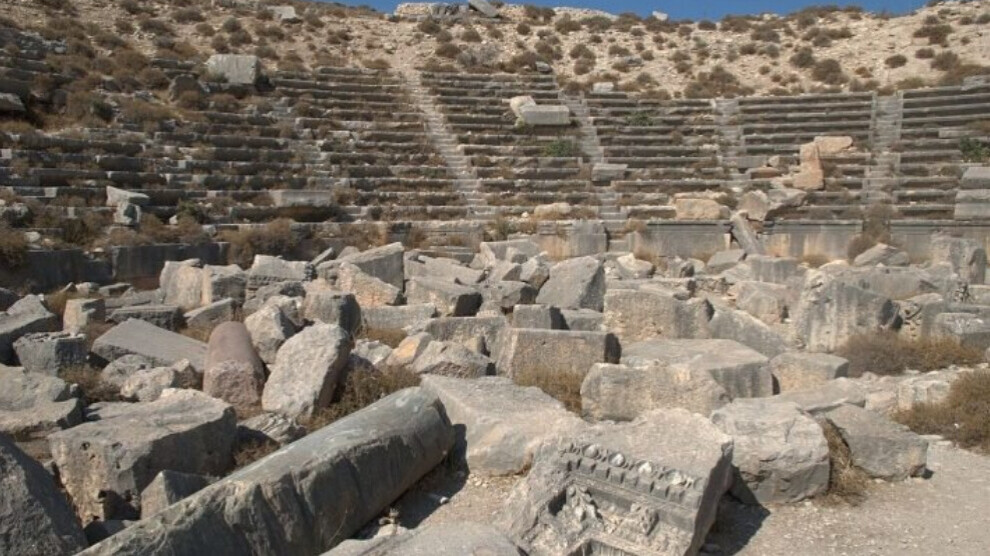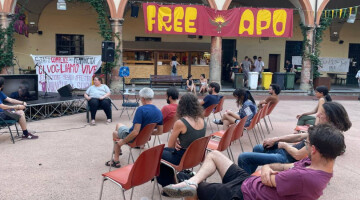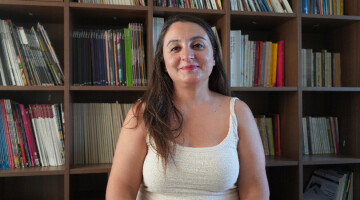The Turkish occupation army and its mercenaries continue to loot important historical sites in occupied territories of North-East Syria with the aim of obliterating the cultural and civilizational heritage of the peoples of the region.
The Turkish occupation army bulldozed and looted the historical Kishur Hill. The hill is located in the Rajo district of Afrin which has been occupied by the Turkish army and allied mercenaries since March 2018.
The hill had been excavated and looted by the mercenaries back in 2019 as well.
According to the Syrian Observatory for Human Rights (SOHR), Turkish state forces asphalted and looted the hill in early 2021.
On the other hand, the observatory reported that the Turkish-backed Jabhat al-Shamiya mercenaries carried out excavations in search of historical artifacts in the village of Akda in the Azaz city north of Aleppo.
BACKGROUND
Since 18 March 2018, the northern Syrian canton of Afrin has been occupied by the Turkish military and jihadist militias. Reports of victims of torture, looting, robbery, kidnapping and violent repression have not stopped since. Many people who did not want to leave Afrin during the evacuation in March had to flee later due to the atrocities of the occupying forces.
The Turkish state attacked Afrin from the air and on the ground starting from 20 January. Militias that originated from al Qaeda, such as al-Nusra or the Islamic State (IS), were mixed into the groups of the so-called "Free Syrian Army" and led the occupation operation of Turkey on Afrin. Men, women and children were killed indiscriminately. After the Salafist groups marched into Afrin city on March 18, the destruction of the symbols of self-government and the plundering of the city began. The world powers, the US, the EU and the UN, who themselves feared the spread of the grassroots model of democracy, have agreed to the massacres, killings, looting and evictions through their silence.
As the world closes its eyes to the daily growing crimes in the city, those who refused to leave Afrin were forced to flee by means of torture, repression, kidnapping and murder. In the place of the escaped population of Afrin, the FSA militiamen and their families evacuated from Ghouta in line with an agreement with Russia were settled there. There are 41,000 such people and the settlement policy is still ongoing. Ghouta militiamen are jihadists from the Faylaq al-Rahman, Jaisal al-Islam, Tahrir al-Sham and Ahrar al-Sham groups. They also began to terrorize the remaining people in Afrin and to loot anything left as "spoils of war". Those who oppose have been tortured and abducted, while graveyards, sacred and historic places were devastated and ancient objects were stolen and sold. The Kurdish language was banned and people were forced to use the Arabic and Turkish languages. The hanging of Turkish flags and Erdoğan pictures was made mandatory. In particular, Alevi and Yazidi settlements were completely devastated.
The violations of the Turkish army and its mercenary gangs did not only target innocent civilians and their properties in occupied territories but also the historical and cultural sites. The aim is to eliminate the cultural heritage of Afrin as well as its peoples. The targeting and destruction of historical and cultural sites is strictly prohibited by a series of international conventions.
The Turkish occupation army has looted the archaeological sites in all the occupied areas of Afrin, Serêkaniyê, Girê Spî and transferred antiquities they found in the region to Turkey. In the Afrin region alone, at least 75 archaeological sites have been looted by the occupation forces.
While the millennia-old historical buildings in Afrin were deliberately destroyed, pieces of objects and structures were stolen by "FSA" members and sold in Turkey. The majority of the objects were taken to Istanbul, Ankara and Izmir.
Attacks on cultural memory include the destruction of;
Ain Dara ancient settlement which was built before 1300 B.C. near the village of Girê Darê,
The Hurrian site Nebî Hûrî or Cyrrhus built in 2500 B.C., recognized by UNESCO as a place of protection in the Middle East
A Roman church in the village of Kalutê about thirty kilometers south of Afrin,
a castle, a church and many other historical buildings from Roman times in the village of Elbîzka located 40 kilometers northwest of Afrin,
historic buildings from the Mitanni period in the village of Kolpe, 15 kilometers in the southeast of Afrin,
Salah Al Din Mosque and the cemetery of Jindires,
the grave of the legendary well-known Kurdish writer and thinker Nuri Dêrsimî, which was housed in the pilgrimage place in Afrin.
RELATED NEWS:















